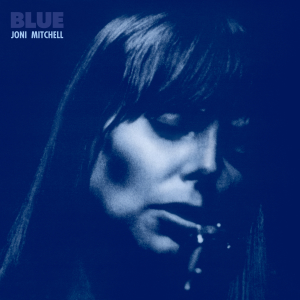
Joni Mitchell – Blue
There are albums that make you feel. And then there’s Blue, which doesn’t just make you feel—it undoes you. It strips you down to your rawest, most vulnerable self, forces you to stare directly into your own soul, and somehow, by the time it’s over, you’re grateful for the experience. There has never been, and likely never will be, an album more emotionally naked than this one. Joni Mitchell didn’t just write Blue—she bled it.
Released in 1971, Blue is the sound of a woman who has nothing left to hide. While rock and folk at the time were still playing around with the idea of confessional songwriting, Joni took it to an entirely new level. She didn’t just write about love—she wrote about love as it actually is: messy, euphoric, devastating, transformative. She didn’t just write about herself—she wrote about all of us. Every heartbreak, every moment of longing, every bittersweet memory—it’s all there, wrapped in her delicate, piercing voice and melodies so achingly beautiful that you can’t help but let them consume you.
It starts with “All I Want,” a song that sounds deceptively breezy until you realize it’s a desperate plea for love, fulfillment, and something more. Then comes “My Old Man,” a love song that refuses to romanticize love—it’s not about grand gestures, it’s about the way someone makes coffee in the morning, the way they exist in your space. And then we hit “Little Green,” and if you know, you know. The moment you realize she’s singing about the daughter she gave up for adoption, the weight of the song crashes down on you like a wave, and suddenly, Blue isn’t just an album anymore—it’s a private diary that you almost feel guilty for reading.
But if the first three songs make you lean in, “Carey” gives you a moment to breathe—a playful, free-spirited travelogue of her time in Greece with a man who was nothing more than a momentary escape. But just when you start to think she’s letting you off the hook, “Blue” arrives, and it’s devastating. It’s sadness distilled into song, the kind of song that doesn’t just express heartbreak—it is heartbreak.
Then there’s “California,” a love letter to home disguised as a road-weary traveler’s rambling thoughts, and “This Flight Tonight,” which captures regret in real-time as she second-guesses every decision she’s made. But the true emotional wrecking ball is “River.” It’s a Christmas song, but not in the way you think—it’s a song about wishing you could disappear, about drowning in your own sadness, about how even the most beautiful times of the year can be unbearable when you’re heartbroken. The loneliness in her voice is so palpable, so real, that even if you’ve never skated away on a frozen river, you feel like you have.
And just when you think you can’t take any more, she closes with “A Case of You” and “The Last Time I Saw Richard.” The former is one of the greatest love songs ever written, a song so intimate and poetic that it feels like it’s being whispered in your ear. The latter is a warning—a bitter, weary reflection on what happens when you let love make you cynical. It’s the perfect way to end an album that has spent the last forty minutes exposing every fragile, messy, beautiful part of the human condition.
What makes Blue one of the greatest albums of all time isn’t just its lyrics, its melodies, or even Joni’s hauntingly pure voice—it’s the fact that no one has ever made something this personal, this real, and this utterly fearless before or since. Artists like Taylor Swift, Brandi Carlile, and countless others have built their careers on the foundations that Blue laid down, but even they would tell you—there’s only one Joni, and there’s only one Blue.
This isn’t just an album. It’s an emotional experience. It’s a mirror. It’s a masterpiece. And if you’ve ever loved, lost, hoped, regretted, or simply felt—then Blue is already a part of you.